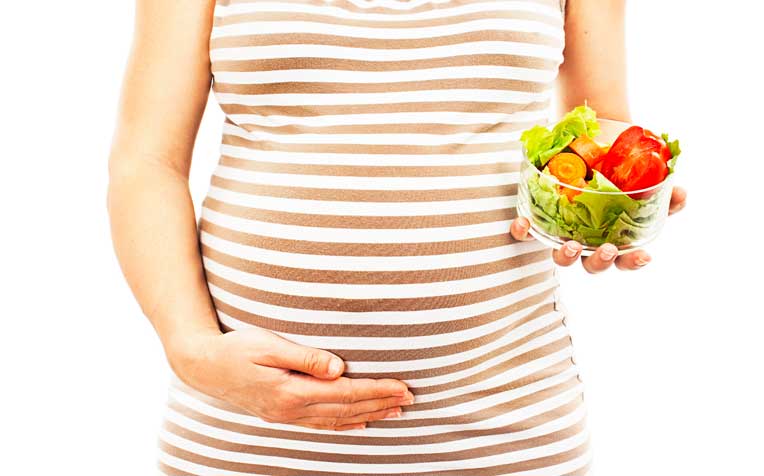
During pregnancy, it is important to eat a variety of healthy foods rich in iron, calcium and folate.
Pregnancy do's and don'ts: folic acid, food, smoking, alcohol and recreational drugs
Pregnancy Do's
-
Folic acid supplementation
Folic acid is a type of vitamin B that is needed for the formation of blood cells and the development of a baby’s nervous system. It has been shown to reduce the chance of a baby having brain and spinal cord defects. A simple way is to take 5mg or at least 400 mcg of folic acid per day, ideally from 3 months prior to conception until week 12 of pregnancy.
- Eat a variety of healthy foods rich in iron, calcium and folate.
Prenatal stimulation
Prenatal stimulation uses various stimuli such as classical music and the mother’s voice. The baby learns to recognise and respond to different stimuli which may encourage physical, mental, and sensory development. Babies may benefit from stimulation as early as the third month of pregnancy. Once babies develop hearing in the fifth month, music is excellent for aural stimulation and to soothe the baby.
- Does it really work?
Some studies have revealed that stimulated babies exhibit enhanced hearing, linguistic, and motor development. In general, they sleep better, are more alert, confident and content than infants who are not stimulated. They also show superior learning capacity and calm down more easily when they hear familiar sounds they heard while in the womb. Stimulated babies and their families show more intense bonding and greater family cohesion. Prenatal stimulation provides a lasting foundation for loving communication and healthy parent-child relationships.
-
Is over-stimulation a concern?
Over-stimulation may cause confusion. When babies receive too much stimulation, they may stop responding. Stick to moderate levels of stimulation if you desire.
Pregnancy Don'ts
-
Smoking
Smoking has adverse effects on both the pregnant mother and her foetus. It can cause an increased risk of miscarriage, premature separation of placenta, premature birth and a low birth-weight baby. There is also a long-term relationship with decreased intellectual development of the infant and increased risk of sudden infant death syndrome (cot death).
Much less is known about the consequences of exposure to passive smoke during foetal development. However, the performance of children of passive smokers was found, in most areas, to be between that of active smoking and non-smoking mothers.
-
Alcohol consumption
Alcohol consumption in pregnancy is linked to infants showing behavioral and learning difficulties. Excessive alcohol consumption is associated with foetal alcohol syndrome (FAS) where the infant may suffer from congenital malformations and mental retardation among other negative effects.
-
Caffeine
Caffeine consumption during pregnancy is controversial. Some studies suggest that a modest caffeine intake of two cups of coffee per day presents a slight risk to the foetus, but others do not. There is some evidence that consuming larger amounts of caffeine daily during pregnancy may increase the risk of miscarriage, pre-term delivery and low birth weight, but these studies are non-conclusive. We recommend limiting any drinks containing caffeine such as coffee, tea and cola to a maximum of two cups per day for the safety of your baby.
-
Diet
Do not focus on weight loss during pregnancy.
-
Recreational drugs
If you have been abusing recreational or “lifestyle” drugs like cocaine, heroine, amphetamine (“Ecstasy pill”), or marijuana, you should quit once you are pregnant. Continuing to consume these substances will be harmful to your developing baby. They are known to cause miscarriage, bleeding in the placenta, stillbirth, low birth-weight and even mental retardation in babies. Birth defects associated with maternal cocaine use include abnormalities of the brain, skull, face, eyes, heart, limbs, intestines, genitals and urinary tract. Discuss this with your doctor so that appropriate help and support can be rendered to you.
Carrying heavy objects in pregnancy
- It is commonly believed that it is unsafe to lift heavy things in pregnancy. However, the risk of injury is usually directed at the mother and not the baby. The increase in the level of hormones during pregnancy causes the ligaments to soften, which leads to joints that may be less stable.
- Also, the centre of gravity in a woman's body shifts during pregnancy which puts more stress on her back. These two factors make a pregnant woman more susceptible to injury when lifting heavy things.
"The New Art and Science of Pregnancy and Childbirth", a pregnancy book by KK Women's and Children's Hospital (KKH), a member of the SingHealth group.
Ref: X08

















 Get it on Google Play
Get it on Google Play